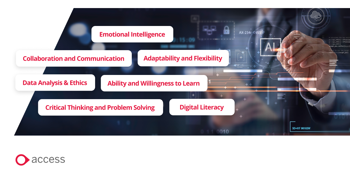Once you've secured buy-in, guide employees and their managers on how to apply AI capabilities strategically. L&D teams can support career development through AI upskilling by providing the following framework.
1. Help employees demonstrate measurable value
Encourage employees to document and share how AI skills improve their performance. Support managers in recognising and quantifying these improvements during performance reviews.
What to track:
- Time savings on routine tasks
- Efficiency gains in project delivery
- Quality improvements in outputs
- Innovation enabled by freed-up capacity
Provide templates or tools that make it easy for employees to capture and communicate these metrics.
2. Identify and develop AI champions within teams
Rather than expecting AI expertise to develop organically, strategically identify employees who show aptitude and enthusiasm for AI tools. Support them in becoming go-to resources for their colleagues.
How L&D can facilitate this:
- Create formal AI champion or ambassador programmes
- Provide advanced training for identified champions
- Give champions time and recognition for peer support activities
- Build communities of practice where champions share learnings
This peer-led approach often drives adoption more effectively than top-down mandates.
3. Connect AI skills to business problem-solving
Help employees and managers identify opportunities where AI capabilities can address real organisational challenges. Frame AI upskilling as enabling innovation, not just efficiency.
L&D's role:
- Facilitate workshops exploring AI applications in different functions
- Showcase internal case studies of AI-driven solutions
- Create channels for employees to propose AI initiatives
- Recognize and reward innovative AI applications
When employees see clear connections between AI skills and valued business outcomes, engagement with training increases.
4. Provide curated resources for staying current
AI capabilities evolve rapidly, and employees need ongoing support to stay informed without becoming overwhelmed by the pace of change.
What L&D can offer:
- Regular "what's new in AI" sessions or communications
- Structured learning pathways: Virtual classrooms on topics like AI Fundamentals and Smart AI Prompting build capabilities systematically
- Just-in-time resources: Nano videos deliver focused insights in minutes, delivering bursts on knowledge on topics such as How AI actually works and AI – How are humans and machines different?
- In-depth exploration: eBooks covering Right-Skilling for the AI-Powered Economy and AI Compliance for Executives & Regulatory Pros support employees developing specialised expertise
- Flexible formats: Audio learning on AI in the Workplace enables AI skill development during commutes
AI and big data top the list of fastest-growing skills, making continuous learning support essential for maintaining relevance.
5. Emphasise complementary human skills development
Help employees understand that AI proficiency combined with strong human capabilities creates the most career value. Design development pathways that build both simultaneously.
Integration strategies:
- Pair AI tool training with critical thinking development
- Combine data analysis upskilling with strategic reasoning
- Link AI literacy programmes to communication skills training
- Emphasize ethical reasoning alongside technical AI capabilities
The most valuable employees won't be AI specialists—they'll be professionals who combine AI proficiency with strong communication, strategic thinking, creativity, and emotional intelligence.

 AU & NZ
AU & NZ
 SG
SG
 MY
MY
 US
US
 IE
IE








